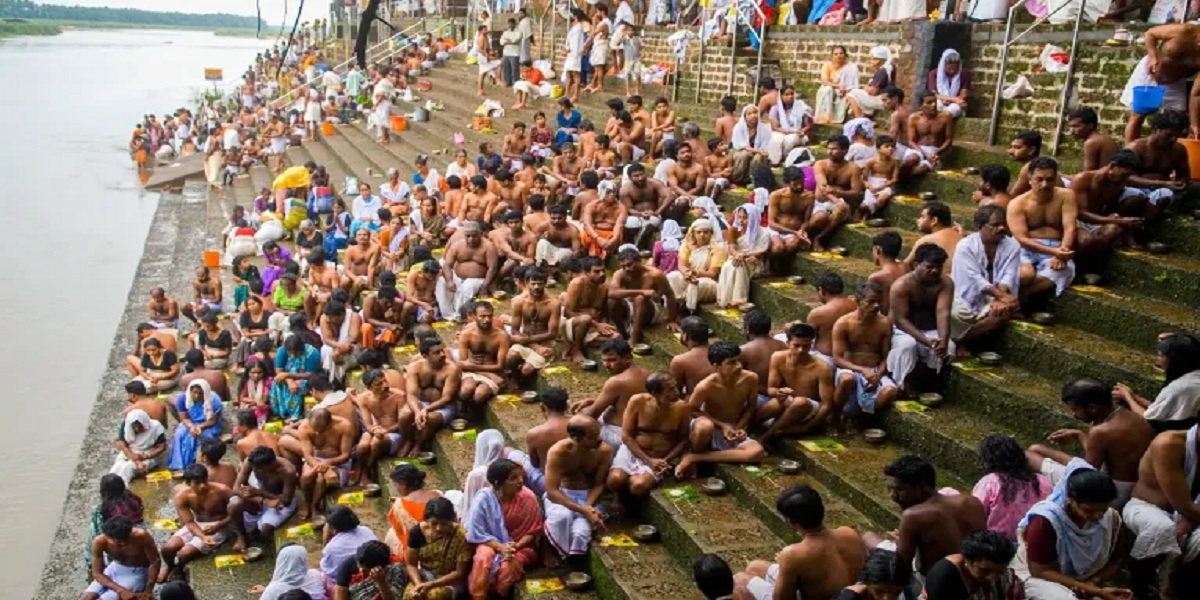The Travancore Devaswom Board has completed preparations across more than 100 temples under its jurisdiction to ensure the smooth conduct of Bali Tharpanam rituals.
Published Jul 24, 2025 | 12:00 PM ⚊ Updated Jul 24, 2025 | 2:02 PM

The Periyar in Kochi, the Pamba near Sabarimala, the Bharathapuzha in Shornur, and the Papanasham Beach in Varkala are among the most popular sites. (Kerala Tourism)
Synopsis: The banks of the Periyar River in Aluva and other key sites across Kerala are set to welcome thousands of devotees on Thursday for Karkadaka Vavu Bali, a the annual remembrance performed to honour ancestors. The Travancore Devaswom Board and Kochi authorities have completed arrangements to ensure smooth conduct of the ceremonies, including enhanced public transport, security, and early-morning temple access.
On Thursday, the banks of the Periyar River in Aluva, Kochi, will transform into a moving tide of humanity. From the early hours before dawn, people are expected to arrive in steady lines, most dressed in traditional attire, carrying offerings to honour their ancestors.
The Aluva Mahadeva Temple grounds will serve as a major centre for the annual spiritual observance. Karkadaka Vavu, often referred to as Karkadaka Vavu Bali, is a collective act of remembrance – an annual farewell that binds the living with the departed.
This year, it falls on the Amavasya (new moon) of the Malayalam month of Karkadakam, which coincides with the monsoon rains in July. The day is considered especially sacred for performing rituals for the dead, known as Bali Tharpanam.
According to Hindu belief, offering these rituals during this time is said to help the souls of departed ancestors attain peace or liberation (moksha).
The Travancore Devaswom Board (TDB) has completed preparations across more than 100 temples under its jurisdiction to ensure the smooth conduct of Bali Tharpanam rituals.
The ceremonies will begin as early as 2.30 am on Thursday, 23 July, and continue until 12.42 am the following day.
Devaswom Minister VN Vasavan, addressing the media in Kottayam, confirmed that all arrangements at major centres – including Thiruvallam Parasuramaswamy Temple, Varkala, Shanghumugham Beach, Thirumullavaram, and the riverbanks at Aluva – have been finalised.
Coordination for the event involves multiple departments, including the police, fire and rescue services, KSRTC, and the revenue department.
The Ernakulam rural police have stepped up preparations in Aluva, deploying nearly 500 personnel to manage the expected crowd. Security has been increased near transit points like bus terminals, metro, and railway stations to ensure public safety and order during the rituals.
Kochi Metro Rail Ltd (KMRL) has announced special metro services to accommodate the large number of devotees expected to visit the Aluva Siva Temple for the Karkadaka Vavu rituals. The extended schedule is aimed at ensuring hassle-free transportation for pilgrims.
To manage the expected surge, KMRL will extend services on both Wednesday and Thursday. On Wednesday, the last trains from the Thripunithura terminal will run beyond regular hours.
Instead of ending at 10.30 pm, services will continue until 11.30 pm, with two additional trains departing for Aluva at 11 pm and 11.30 pm, respectively.
On Thursday morning, services from Aluva terminal will begin earlier than usual, with the first train leaving at 5 am, followed by another at 5.30 am.
Normal metro operations from Aluva will resume from 6 am onwards.
Across Kerala, thousands take part in this ritual with reverence, heading to riversides, temple ponds, and coastal shores.
The Periyar in Kochi, the Pamba near Sabarimala, the Bharathapuzha in Shornur, and the Papanasham Beach in Varkala are among the most frequented sites.
What makes this ritual deeply personal is its emotional significance. Families offer pindam – rice balls mixed with sesame seeds, tulsi leaves, and other symbolic items – while reciting mantras under the guidance of priests.
These offerings are released into flowing waters, symbolically sending prayers to departed loved ones.
The Karkadaka Vavu ritual also stands out for its ecological mindfulness. Every element used – whether rice, banana or lotus leaves, coconut, sesame, or tulsi – is natural and biodegradable. There is no plastic, synthetic packaging, or artificial décor. Participants often attend barefoot and simply dressed, underscoring the humility of the occasion.
The rituals are performed under open skies, against Kerala’s lush, rain-soaked monsoon backdrop. This communion with nature reinforces a key spiritual message: life and death are part of a larger cosmic rhythm, and humans are only passing through.
The month of Karkadakam (June–July) has traditionally been associated with hardship – rain, disease, and an agricultural lull. Offering Bali during this season is seen as both a prayer for the ancestors and a plea for protection and strength for the living.
Despite its centuries-old traditions, Karkadaka Vavu is not untouched by modern realities. Environmental issues such as flooding, sea-level rise, and coastal erosion have affected several traditional ritual sites.
In some areas, riverbanks have collapsed or been submerged, making it difficult for families to return to ancestral locations.
Still, communities remain determined. Local governments, temple authorities, and environmental groups have initiated efforts to restore and protect sacred spaces. Temporary platforms, makeshift ritual zones, and even digital announcements help keep the tradition alive.
At its core, Karkadaka Vavu remains a solemn bridge between past and present. It speaks not only to spiritual beliefs but also to emotional truths – about loss, continuity, and the desire to stay connected across generations.
(Edited by Dese Gowda)
